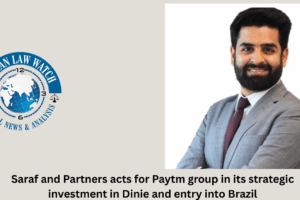Article 145(3) – This article provides that for the purpose of deciding a substantial question of law as to the interpretation of the constitution or for the purpose of hearing any reference under Article 143, the number of the judges would be five.
JUDGMENTS
The various judgments in which Article 145(3) was in dispute are:
In Rao Shiva Bahadur Singh v. The State of Vindhya Pradesh AIR 446, 1955 SCR (2) 206, the appellants challenged the validity of their conviction under Vindhya Pradesh Criminal Law Amendment (Special Court) Ordinance to be violative of Article 14& 20 of the constitution. They contended that no appeal lays Judicial Commissioner. The court held that the prohibition under Article 20 applies conviction under ex-post-facto laws and not to trial thereof. The petitioner argued that his case should be allowed to be heard by the constitution bench as it challenges important provisions of the constitution. But the court does not accept his reasoning as the constitutional provisions are clear and hence needs no interpretation and hence will not be referred to the constitutional bench so as to save the time of the court. This article does not violate the principles of natural justice.
Then in 1960, the Supreme Court tried to clarify the scope of Article 145(3) in State of J&K v. Thakur Ganga Singh, 1960 SCR (2) 346, the appellants applied in the High Court of J&K for a grant of certificate under Article 132(2) but it rejected on the ground that it raises no substantial question of law as to the interpretation of the constitution. Then the appellants applied for special appeal under Article 132(2) for interpretation of Article 14. The court stated that the said principles were reaffirmed in the case of Chiranjit Lal Choudhary v. Union of India 1951 AIR 41, 1950 SCR 869, Mohammad Hanif Qureshi v. State of Bihar 1958 AIR 731, 1959 SCR 629 and Rama Krishna Dalmia v. Justice Tendolkar 1958 AIR 538, 1959 SCR 279, the court held that the Article 14 has already been interpreted in the said cases and there is no need for further interpretation. It was also observed that a substantial question of interpretation of a provision of the constitution cannot arise for a point of law that has been already decided by the court.
In Shrimanth Balasaheb Patil& Ors. v. Hon’ble Speaker, Karnataka Legislative Assembly& Ors.[2019 SCC OnLine SC 1454], it was again observed by Supreme Court that not all the matters would be referred to the constitutional bench. Only appropriate matters would be referred after considering that unmeritorious references that do not unnecessarily consume the precious time of the court. It was also observed that any question of general importance which arise incidentally to the question of law and which have no significance to the final outcome will not be considered as a substantial question of law.
The court is yet to determine that what would be the substantial question of law under Article 145(3) which is to be decided by the constitution bench.
In one of the recent case of Shanti Bhushan v. Supreme Court of India, (2018) 5 SCC 341, the petitioner challenged that only the Chief Justice of India should not be given the power of deciding the important and substantial questions alone and it should be decided by collegiums of five senior-most judges. There should be minimum discretion in a country of rule of law. The CJI cannot decide in his individual capacity without consulting with other judges. The court interpreted Article 145 and held that whenever any reference is made by a bench to a larger bench which judges will constitute that bench will be decided by the Chief Justice. No mandamus can be issued to the body or authority who is vested with the rule making power. Thus, the petitioner is not entitled to seek a direction that a bench should be created in a particular manner. This is the prerogative power of CJI to constitute benches and allocate cases to them. In-State of Rajasthan v. Prakash Chand, AIR 1998 SC 1344 the judges were referred to as the Guardian of Constitution who discharges all the judicial functions and maintains the independence of the judiciary. The actions of the judges must be judicious in character. The constitution does not give the judges unlimited power. They should be impartial while deciding a case.
In Indian Young Lawyers Association v. State of Kerala 2018 SCC SC 1690, it is also known as Sabrimala’s Case in which the entry of the women was banned in the Sabrimala Temple. It was challenged on the ground of violation of Article 14 of the constitution. The reference was made to the larger bench for the consideration of the matter. The court held that it can determine its own jurisdictions for the exercise of the inherent powers and it can make any orders under Article 142 of doing complete justice. When any review petitions are made before the courts first of all its validity is to check before referring it to the larger bench. Reference to a larger bench can be made on any cause or appeal as well as other proceedings. It is the widest freedom given to the court to do complete justice with the parties. Supreme Court is an apex court that has jurisdiction in every matter and hence the reference in the given case cannot be challenged on the ground of lack of jurisdiction.
Recently, a dispute was resolved by the constitutional bench in K.Rajalingam v. R.Suganthalakshmi on 28 May 2020, Criminal Appeal Nos.89 & 90 of 2020.
The doubt was raised as to the maintainability of the appeal by the complainant against the order of acquittal confirmed before the court of sessions invoking the proviso to Section 372, Crpc. The question arose that when the magistrate acquits the accused in a case instituted on a private complaint, where the remedy lay for an unsuccessful complaint- to the Court of Session under Section 372 Crpc or before the High Court under Section 378(4) & (5). The question was raised that whether the victim or complainant is the same or different. The full bench in Satya Pal Singh v. State of MP& Ors 2016 (1) ACR 5 SC, held that the term victim also includes the complainant and he can also avail the remedy under proviso to Section 372 of Crpc and can file an appeal against the acquittal.
In K. Rajalingam v. R. Suganthalakshmi, the Hon’ble Chief Justice referred the matter to the full bench consisting of three judges to answer the questions raised. This reference was made in accordance with earlier decisions of the apex court. In case the accused is acquitted by the Judicial Magistrate of First Class, the complainant can appeal to the High Court under Section 378(4) Crpc and thereafter for special leave to appeal to Supreme Court under Article 136 of the constitution. Such an appeal could not be filed in the Sessions Court.
The full bench also held that where the orders or the judgments have become final between the parties and it has been accepted by them and they have accordingly acted upon it, then it will not be allowed to reopen. A party cannot disregard the order or a judgment on the ground that it is void.
- Section 372 of Crpc states that appeal against any order or judgment shall lie only on the provisions provided by this code or any other law. the victim shall have the right to prefer an appeal against any order passed by the court acquitting the accused or convicting for a lesser offence or for imposing inadequate compensation and appeal will lie to the court where it will lie ordinarily against the order of conviction.
- Section 378 (4)- If an order of acquittal is passed in any case instituted upon a complaint and High Court on an application made by the complainant grants special leave to appeal from the order of acquittal, the complainant may present such appeal to the High Court.
- Section 378 (5)- But such application shall be entertained for grant of special leave to appeal after the expiry of six months where the complainant is a public servant and sixty days in other days computed from the date of acquittal.
ABOUT THE AUTHOR CHERRY JAIN Former Intern, Indian Law Watch (2020) Law graduate-B.A.LL.B, Chander Prabhu Jain College of Higher Studies & School of Law (Affiliated to Guru Gobind Singh Indraprastha University)









 New building for Goa Bench of the Bombay High Court (Porvorim) Inaugurated giving Vision of ‘National Judicial Infrastructure Corporation’: Justice Ramana
New building for Goa Bench of the Bombay High Court (Porvorim) Inaugurated giving Vision of ‘National Judicial Infrastructure Corporation’: Justice Ramana



Recently, the Supreme Court of India referred the petitions challenging the 103rd Constitutional Amendment Act, 2019 to a five-judge constitution bench, saying it involves ‘substantial questions of law’.
According to Article 145 (3) of the Constitution, at least five judges need to hear cases that involve ‘a substantial question of law as to the interpretation’ of the Constitution, or any reference under Article 143, which deals with the power of the President of India to consult the Supreme Court.
The Supreme Court bench consisting of at least five judges is called the Constitution bench.
103rd Constitutional Amendment Act:
It introduced an economic reservation (10% quota) in jobs and admissions in education institutes for Economically Weaker Sections (EWS) by amending Articles 15 and 16.
It inserted Article 15 (6) and Article 16 (6).
It was enacted to promote the welfare of the poor not covered by the 50% reservation policy for SCs, STs and Socially and Educationally Backward Classes (SEBC).
It enables both Centre and the states to provide reservation to the EWS of society.